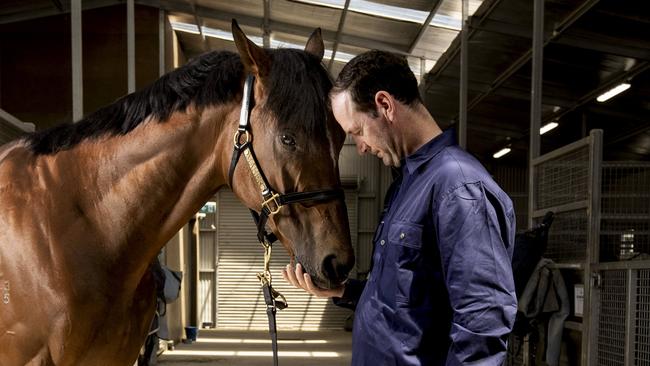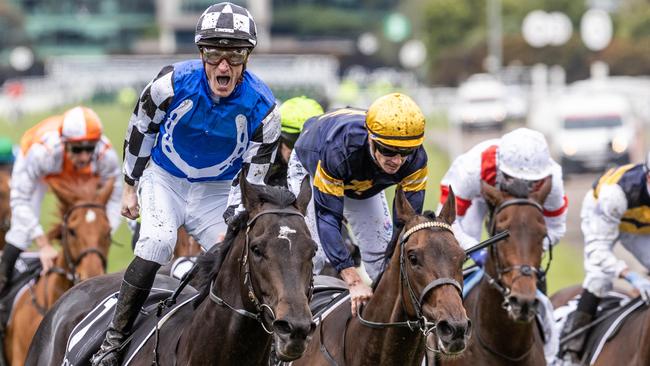How Gold Trip helped farm boy Ciaron Maher become a horse racing star
Trainer Ciaron Maher has gone from Warrnambool in western Victoria to the top of the racing world, and built one of the most sophisticated business models in the sport.

He’s the shy dairy farm boy from Warrnambool who has gone on to build the most sophisticated, cutting-edge and rapidly growing racehorse training operation in Australia.
Trainer Ciaron Maher is back to try to win the Melbourne Cup again with Gold Trip, having triumphed last year for the first time in his still relatively young career.
After good runs in the Caulfield Cup and Cox Plate on the last two weekends, Maher takes Gold Trip into the big race on Tuesday as second favourite and full of hope.
“I don’t reckon he could be better,” Maher says of the six-year-old bay stallion he believes has become a special horse.
“People at the racecourse will stand and look at him. We get people … asking … to spend time with Gold Trip, it would make their life, that sort of thing.
“It is good to see. It is a special time of year for racing. It is what is different about Australia, everyone talks about it. You talk about marketing, well, there’s no bigger race nationally as a horse trainer to win.”
Maher could have up to six runners in the race that stops the nation and that has made him a racing industry star. Gold Trip is his “first seed”, heading a group he oversees with training partner David Eustace that could include Future History, Right You Are, Ashrun, Interpretation and United Nations, if it wins Saturday’s Lexus Archer Stakes at Melbourne’s Flemington.
“They say winning the Cup changes your life,” Maher tells The Weekend Australian. “I’m not sure about that, but it certainly opens a lot of doors.
“You probably don’t realise how far the news reaches until you do win one, nationally and internationally. It definitely makes a difference.
“And it is our grand final or grand prix; you just want to win it again.”
Ciaron Maher Racing is big in Melbourne, but Maher has now set his sights on being just as big on the Sydney scene and has seven facilities across Victoria and NSW. The operation is one of the biggest around, and Maher says it has grown by him taking a “series of calculated risks over the past decade.
Maher has about 600 horses, 200 of which are usually in training for races, and about 300 staff and trainers using the latest data analytics and sports medicine technology to find a winning edge.

His horses have won about $130m in prize money in five years, including big races such as the Melbourne Cup, Cox Plate and Caulfield Cup for what is now about 6000 owners and, while Maher won’t reveal its exact revenue, his business likely turns over tens of millions of dollars a year. The earnings have allowed Ciaron Maher Racing to be built like a proper business, says its chief executive, Ben Sellenger. “If you looked at our internal structure it would mirror a lot of corporates in the top 100. You’ve got your verticals in finance, marketing, commercial, data, sport science, human resources, bloodstock.”
It is the adoption of practices from sports clubs in using data and sports science that Sellenger believes sets the stable apart from most other horse trainers.
“We’ve got seven people in our data team and a sports science team of four. They will go through analysis of all the training data, GPS data, lactate levels (in muscles), heart rate recovery and variability to all see how the horses are travelling and to assist in their training and recovery.”
Maher says he and the trainers and staff are “always refining and assessing, doing the data analysis on the horses and the business as well – we’re always looking for efficiencies and all those small things to improve and find those 1 per cent gains”.
It has all led to his business doubling the prize money it has won in four years, with about $31m won during 2023 before the Melbourne Cup Carnival this week.
Prominent racehorse owner Brae Sokolski, who won the 2020 Cox Plate with the Maher-trained Sir Dragonet, says the operation stands out for operating like a business rather than an old-fashioned training centre.
“The innovation they are bringing to the industry is setting a new benchmark, and other trainers have been forced out of their complacency,” Sokolski says.
“Ciaron is a knockabout, disarmingly humble, down-to-earth bloke and not necessarily the type of character that you would envisage being so open-minded, forward-thinking and strategic. It belies his laconic character.”
It was little more than a decade ago Maher had to be convinced by his mentor, Warrnambool meat baron Colin McKenna, to leave town early Sunday with only three thoroughbreds – one, Moudre, was lame – in his horse float and drive up the highway from western Victoria to Melbourne to have a crack at training in the big city.
“He called me at 4.15 in the morning and he had those three horses, two of them were jumps horses, and he said ‘Moudre has just injured his tendon and I’m putting it back in the box and I don’t know what to do’,” McKenna recalls.
“I said ‘drag that horse out of the box, get the float and do all you can to get to Melbourne’. And look at him today. He’s gone from a bloke from the bush with three horses on a float to all this.”
By then Maher had racked up a Group 1 win with 100-1 shot Tears I Cry when he was 26 and training out of a few horse boxes at the family farm, after previously having a crack at being a jumps jockey before stopping at 23.
Maher had grown up on a dairy farm, with a pony and a paddock full of cows that helped teach him about caring for animals and keeping them alive and well.
“I’ve never seen such a good horseman,” says McKenna. “He’s got a sixth sense a … I’ve seen him walk into a paddock when a young horse is a bit wild and he’s talking on his phone, and the next moment he’s got it under control. He’s an amazing human.”
Maher would go on to win the Caulfield Cup in 2016 with Jameka for McKenna, a prominent racing owner, but had a big setback a year later when his training licence was suspended for six months after admitting he should have known five horses he prepared were owned by convicted conman Peter Foster.
Maher says there was a silver lining. “We made the best of a bad situation and the business was restructured so much (with the help of McKenna and Gold Coast businessman and Maher’s chairman, Jonathan Crisp) that when I came back we were able to expand.”
Fortuitous moments helped the growth story, including taking over trainer Peter Moody’s stables in 2017 after Moody temporarily quit following a suspension, then buying the Ballarat training complex of disgraced trainer Darren Weir two years later.
More recently, Maher has expanded his operations at Sydney’s Warwick Farm and taken over Bong Bong Farm, a state-of-the-art property nestled in the NSW Southern Highlands.
“We wanted to replicate what we have in Victoria up in NSW and I’m very happy with what we have, and we can race and transport horses anywhere up the east coast now,” Maher says.
As for Tuesday, warm weather may make it harder for Gold Trip and last year’s winning jockey, Mark Zahra, cited the forecast as a reason he has chosen to ride Without A Fight instead.
But McKenna has no doubt Maher will win plenty of cups in his career, comparing him to 12-time Melbourne Cup-winning great Bart Cummings.
“I tell people Bart won plenty but wait until you see what Ciaron does. He will win plenty of ’em. Don’t worry about that. He will win plenty.



